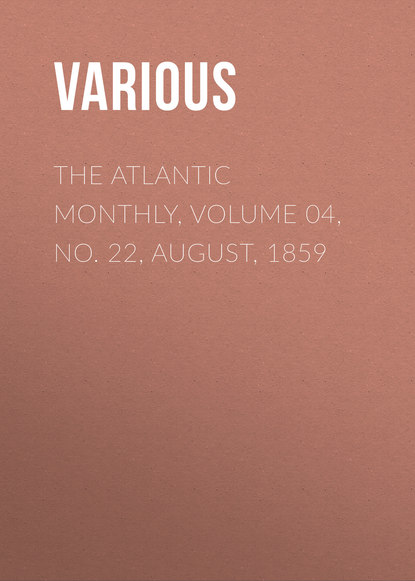По всем вопросам обращайтесь на: info@litportal.ru
(©) 2003-2024.
✖
The Atlantic Monthly, Volume 04, No. 22, August, 1859
Автор
Год написания книги
2019
Настройки чтения
Размер шрифта
Высота строк
Поля
Hitty sank back on her pillow with a sigh; she did not even question the old negress who sat crooning over the fire, as to where she was, or what had befallen her; but accepted this new place as only another misty delirium, and in her secret heart prayed, for the hundredth time, to die.
Slowly she recovered; for prayers to die are the last prayers ever answered; we live against our will, and tempt living deaths year after year, when soul and body cry out for the grave's repose, and beat themselves against the inscrutable will of God only to fall down before it in bruised and bleeding acquiescence. So she lived to find herself immured in this damp and crumbling house, with no society but a drinking and crime-haunted husband, and the ignorant negroes who served him,—society varied now and then by one or two men revolting enough in speech and aspect to drive Hitty to her own room, where, in a creaking chair, she rocked monotonously back and forth, watching the snapping fire, and dreaming dreams of a past that seemed now but a visionary paradise.
For now it was winter, and the heavy drifts of snow that lay on Dimock's meadow forbade any explorations which the one idea of finding her child might have driven her to make; and the frozen surface of the river no white-sailed ship could traverse now, nor the hissing paddle-wheels of a steamer break the silence with intimations of life, active and salient, far beyond the lonely precinct of Abner Dimock's home.
So the winter passed by. The noises and lights that had awoke Hitty at midnight in the house at Greenfield had become so far an institution in this lonely dwelling that now they disturbed her sleep no more; for it was a received custom, that, whenever Abner Dimock's two visitors should appear, the cellar should resound all night with heavy blows and clinking of metal, and red light as from a forge streamed up through the doorway; but it disturbed Hitty no more; apathy settled down in black mist on her soul, and she seemed to think, to care, for nothing.
But spring awoke the dead earth, and sleeping roots aroused with fresh forces from their torpor, and sent up green signals to the birds above. A spark of light awoke in Hitty's eye; she planned to get away, to steal the boat from its hidden cove in the bushes and push off down the friendly current of the river,—anywhere away from him! anywhere! though it should be to wreck on the great ocean, but still away from him! Night after night she rose from her bed to hazard the attempt, but her heart failed, and her trembling limbs refused their aid. At length moonlight came to her aid, and when all the house slept she stole downstairs with bare, noiseless feet, and sped like a ghost across the meadow to the river-bank. Poor weak hands! vainly they fumbled with the knotted rope that bound the skiff to a crooked elm over-hanging the water,—all in vain for many lingering minutes; but presently the obdurate knot gave way, and, turning to gather up her shawl, there, close behind her, so close that his hot breath seemed to sear her cheek, stood her husband, clear in the moonlight, with a sneer on his face, and the lurid glow of drunkenness, that made a savage brute of a bad man, gleaming in his deep-set eyes. Hitty neither shrieked nor ran; despair nerved her,—despair turned her rigid before his face.











